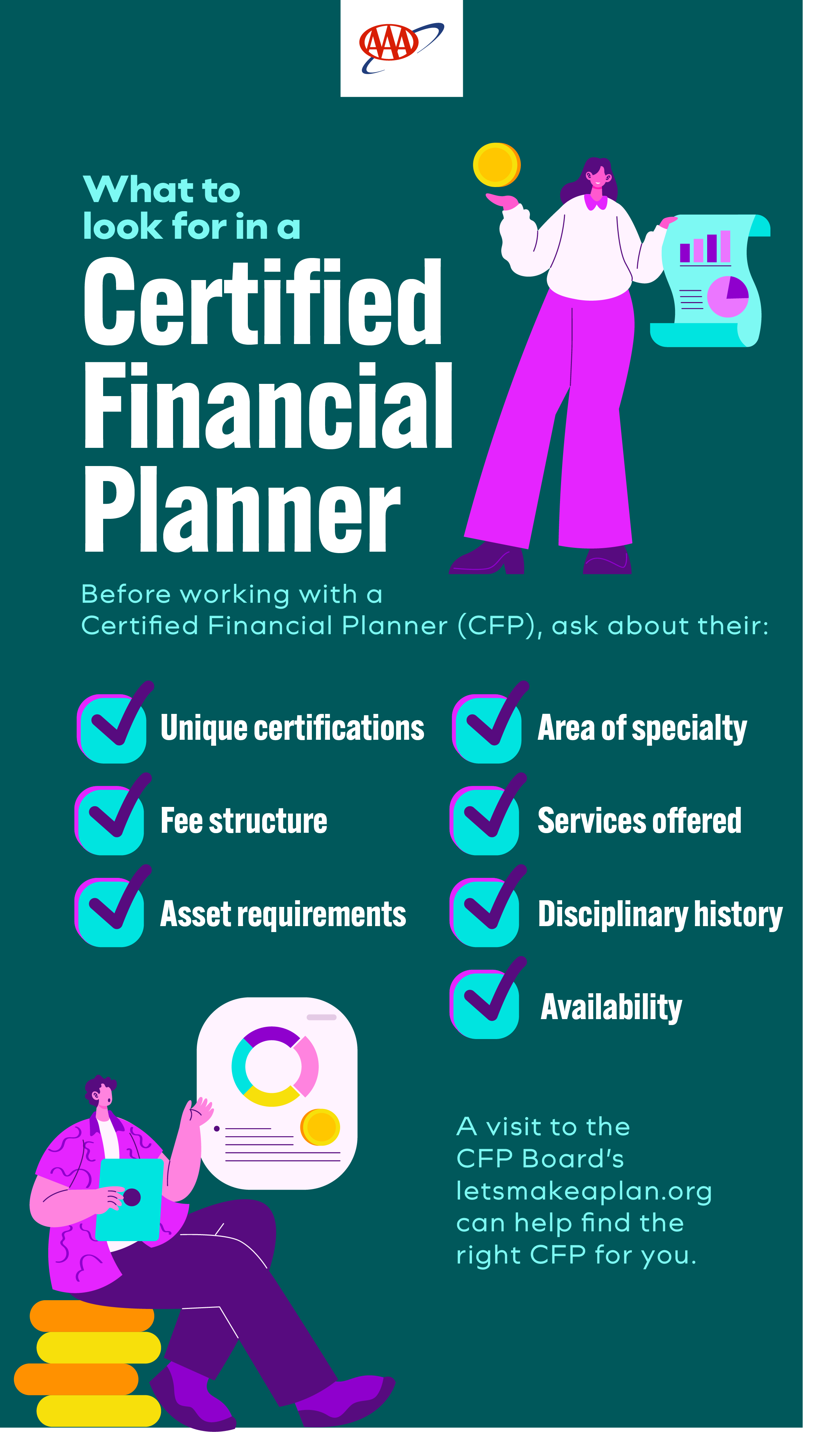What Is a Certified Financial Planner (and Why Do I Need One)?
If you’re in the market for long-term strategic guidance to improve your financial situation, there’s no better time to enlist the aid of a professional planner.
 Getty
Getty
As an adult navigating life’s financial landscape, you may come to a point where you feel like you could use some expert assistance. You might have a complex tax situation due to owning a business or real estate, or you may have significant debt. Perhaps you’ve recently come into an inheritance. Or maybe you just want to be sure you’ll be in the best shape possible when it’s time to retire. Each of these scenarios can be fully explored and addressed with the help of a Certified Financial Planner (CFP), a financial advisor who has undergone extensive training and certification.
CFPs are professionals who can focus their efforts on long-term strategic plans and, because they’re required to put your interests first whenever they provide financial advice and financial planning services, they’re uniquely qualified to serve you. If you want to learn more about whether a CFP might be a good fit for your situation, read on to see what skills they bring to the table, the ways they can assist you and how to pick the right one.
 Getty
Getty
Understanding CFPs
Although a CFP is a financial advisor, not all financial advisors are CFPs. According to the CFP Board of Standards, CFPs are distinguished by meeting specific standards in education, experience and ethics. To obtain certification, they must successfully complete a multi-year, multi-step process and pass an exam that tests their ability to apply financial planning knowledge to real-life situations. Prior to certification, they’re required to have accrued at least 2 years of experience providing financial planning services; once certified, they’re obligated to meet continuing education requirements.
A CFP professional takes a comprehensive approach to your financial situation and offers services that are customized to your needs. Depending on your financial and personal circumstances, you may have one or more specific areas of financial planning that can be focal points.
- Retirement Planning. A CFP can help you reach a comfortable retirement by assessing your current financial situation and estimating future expenses, identifying income sources and creating a plan for saving.
- Tax Planning. By maintaining your position in a certain tax bracket, a CFP can help you reduce the amount of taxes you’ll need to pay.
- Estate Planning. A CFP can help preserve, manage and distribute assets to your beneficiaries and may also help manage financial obligations.
- Risk Management. Identifying, assessing and controlling financial, legal and strategic risks can help a CFP protect your capital and earnings.
- Investment Management. A CFP can manage your financial assets (a process also known as portfolio management or wealth management) to build a portfolio of stocks, bonds and other investments based on your goals.
Who Needs a CFP?
As measured by the Global Financial Literacy Excellence Center’s Personal Finance Index, financial literacy in the U.S. has been holding at about 50% for the last eight years. Although that overall lack of financial acumen can be cause for concern, anyone can address their own shortcomings by enlisting a CFP. And no matter your stage of life, it’s likely a CFP can provide valuable assistance with your finances. Young professionals can learn to lay the foundations for a secure future; families with children can take steps to allow for higher education; and retirees can manage their finances so they don’t outlive their assets.
Although someone with complex finances stands to gain a significant advantage when working with a financial professional, the truth is that anyone looking to optimize their situation and achieve specific goals can benefit from the training and experience of a CFP. Do you own a business and need to ensure that it’s performing to its full potential? A CFP can help analyze its performance and recommend smart decisions. Does your estate require effective protection and asset management? A trained professional can help you achieve those objectives as well as protect your beneficiaries and ease the burden on loved ones who may have to make choices about your health or finances at some point in the future. Are you getting ready to leave the workforce? A CFP can show you how much you need to save and invest to achieve your retirement goals.
 Fact & Fiction
Fact & Fiction
Why Is a CFP Important?
Just as no two individuals have the same financial goals, the approach taken to address your specific objectives needs to be unique. That’s why the personalized approach of a CFP can’t be beat. You’ll get a professional review of your circumstances, including such things as retirement and bank account statements, and your objectives, whether they’re plans for your retirement or for your children’s educations.
The code of ethics and standards that a CFP commits to following gives them what’s called fiduciary duty. As a fiduciary, they are obligated to put the interests of their clients (known as their beneficiaries) above their own, and they can even be sanctioned or lose their certification if they don’t. In broad terms, fiduciary duty requires a CFP to fulfill all their duties without violating the law, to keep their clients’ information private, to fully divulge any potential conflicts that arise, and to disclose all information that could impact the beneficiary. When you work with a fiduciary, you can rest assured that they are acting in your best interests.
Where should you look to find a reputable financial planner, and what questions should you ask?
Find OutThe Financial Planning Process with a CFP
Just as there are myriad financial situations that people can have that lead them to the service of a CFP, some CFPs are better suited to focus their efforts on one particular need versus another. One CFP might be better at dealing with financial student debt, for example, while another may be more able to help someone looking to maximize their charitable giving. To find the right CFP for you, consider connecting with a few different ones, meet with them to review your needs and evaluate their areas of expertise and, finally, select the one that’s the best fit.
Once you’ve chosen a CFP to assist you with your financial planning, you can expect them to do some or all of the following things.
- Review your current situation. An audit of your savings, investments and other assets is the first step in an assessment of your financial health.
- Assess potential risks. A review of your insurance coverage and outstanding debts broadens the picture of your current financial situation, and it’s an important step in navigating the financial impact of major life events.
- Help you set goals. Forming a clear plan of action puts you in control of your money and ensures it’s being used to achieve your objectives. This may include things like deciding to get insurance to protect your assets or managing an investment portfolio to support your retirement.
- Work to create your personal budget. Think of this as your customized roadmap to meeting your long-term goals.
- Assist with other financial activities. There are many facets to your financial identity. A CFP is trained to know how to make the different parts work together to your advantage and will be able to focus on things as diverse as your tax returns, retirement planning and estate management.
Setting Yourself Up for Success
The more you consider your financial landscape, the better you’ll understand the value of having a trained professional in your corner. That’s why getting in touch with a CFP—someone who’s committed to always working towards your best interests—is a logical step in securing your financial future. Their expertise can be the key to helping you reach your personal financial goals.